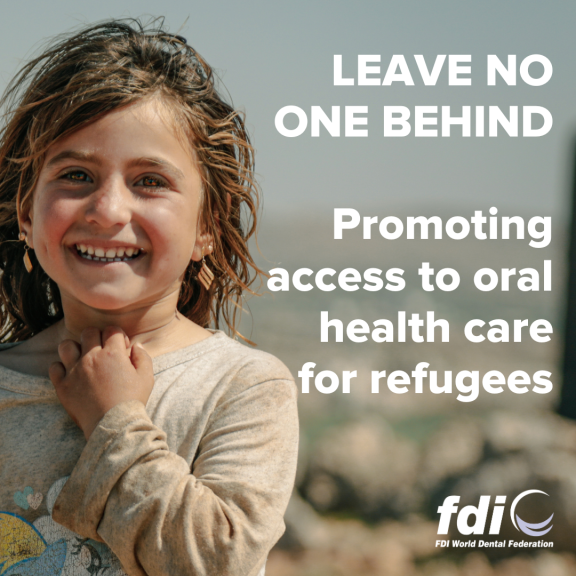New policy brief advocates for improved refugee oral health
Check out FDI's latest Policy Brief on refugee oral health needs, developed in collaboration with UNHCR. This comprehensive document outlines the critical challenges and offers strategic recommendations to ensure essential oral health services for refugees.

On World Refugee Day, a significant step was taken towards enhancing the well-being of millions of refugees worldwide. FDI World Dental Federation, in collaboration with the United Nations High Commissioner for Refugees (UNHCR), launched a comprehensive policy brief titled "Addressing Oral Health Needs in Refugees: Policy and Collaboration Strategies."
The policy brief highlights the urgent need for concerted efforts to address the oral health challenges faced by refugees. As of mid-2023, the global refugee population reached 36.4 million, doubling over seven years. Refugees, often housed in low- and middle-income countries, face significant barriers to accessing healthcare, including oral health services. These barriers include limited resources, displacement, cultural and language differences, and a shortage of skilled healthcare professionals.
Critical challenges and strategic recommendations
The policy brief identifies several critical issues affecting refugee oral health:
- High Burden of Oral Diseases: Refugees experience high rates of untreated dental caries, periodontal diseases, oral infections, and trauma.
- Impact on Quality of Life: Poor oral health affects refugees' ability to eat, speak, and socialize, posing obstacles to integration and resettlement.
- Economic Strain: Untreated oral health issues increase the demand for emergency dental interventions and higher healthcare costs for host countries.
To address these challenges, the policy brief proposes integrating oral health into primary healthcare systems and universal health coverage (UHC) frameworks. This integration would ensure refugees receive comprehensive oral healthcare, reducing long-term healthcare costs and improving overall health outcomes.
Policy Recommendations
The policy brief offers specific recommendations for different emergency phases:
- Mitigation and Preparedness: Include oral health in primary healthcare systems, increase support and funding, and develop culturally appropriate oral healthcare programmes.
- Emergency Response: Ensure essential oral health is part of the initial emergency response, prioritize disease management and prevention, and integrate oral healthcare into established public health programmes.
- Post-Emergency: Establish data collection mechanisms and empower refugee communities to participate in healthcare planning and advocacy.
FDI's Commitment to Refugee Oral Health
FDI has been a strong advocate for promoting oral health among vulnerable populations, including refugees. Through initiatives such as Vision 2030: Delivering Optimal Oral Health for All and the Refugees Oral Health Project, FDI demonstrates its commitment to improving oral health outcomes. These efforts underscore the importance of involving health professionals and organizations in advocating for policies that address the unique oral health needs of refugees.
Upcoming FDI World Dental Congress
The discussion on refugee oral health will continue at the FDI World Dental Congress, scheduled for September in Istanbul. A dedicated session will delve deeper into FDI’s work for refugee populations, providing a platform for stakeholders to collaborate on solutions to improve oral health services for refugees.
Keeping the momentum
The launch of this policy brief marks a pivotal moment in addressing the oral health needs of refugees. This document is the result of FDI's active participation in the WHO high-level technical meeting on noncommunicable diseases (NCDs) in humanitarian settings, held in Copenhagen last February. By implementing the recommendations, stakeholders can ensure that refugees receive essential oral healthcare, contributing to their overall well-being and facilitating their integration into new communities. Investing in refugee oral health is not only a humanitarian imperative but also a strategic move towards achieving global health equity and sustainable development.
For more information on the policy brief and upcoming sessions at the FDI World Dental Congress, visit https://www.fdiworlddental.org
